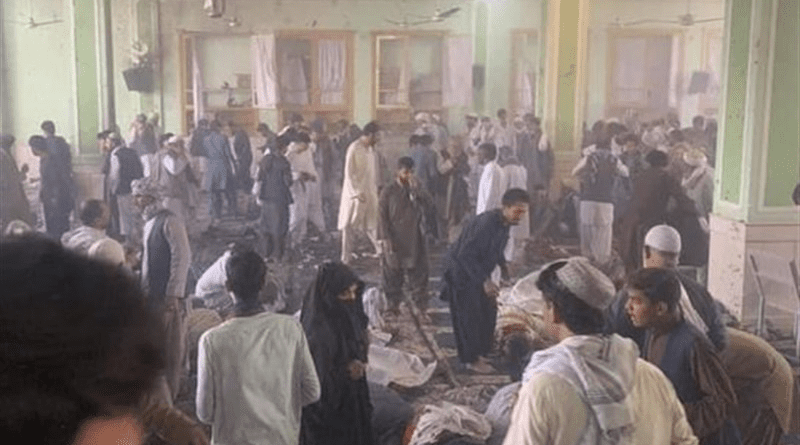Afghanistan: Surge In Islamic State Attacks On Shia – HRW
The Islamic State of Khorasan Province (ISKP), an armed group affiliated with the Islamic State (ISIS), is carrying out bombings and other targeted attacks against Afghanistan’s Shia religious minority that amount to crimes against humanity, Human Rights Watch said Monday. The group has also carried out other mass casualty attacks, including the August 29, 2021 suicide bombing at Kabul’s airport that killed 170 Afghans, mostly civilians.
The ISKP has claimed responsibility for many recent unlawful attacks on the Hazara Shia community, including suicide bombings that killed at least 72 people at the Sayed Abad mosque in Kunduz on October 8, and a bombing that killed at least 63 people at the Bibi Fatima mosque in Kandahar on October 15. After the Kandahar attack, ISIS issued a statement saying it would target Shia in their homes and centers “in every way, from slaughtering their necks to scattering their limbs… and the news of [ISIS’s] attacks…in the temples of the [Shia] and their gatherings is not hidden from anyone, from Baghdad to Khorasan.”
“The ISKP armed group has repeatedly carried out devastating attacks that appear designed to spread terror and inflict maximum suffering particularly on Afghanistan’s Hazara community,” said Patricia Gossman, associate Asia director at Human Rights Watch. “The numerous attacks targeting Hazaras amount to crimes against humanity, and those responsible should be brought to justice.”
The ISKP has posed a serious threat to Hazaras and other Afghan civilians since at least 2015, when the Islamist armed group began attacks on mosques, hospitals, schools, and other civilian facilities, especially in predominantly Shia neighborhoods. These attacks have killed at least 1,500 civilians and injured thousands more, mostly religious minorities.
ISKP attacks have taken place in Kabul, Jalalabad, Herat, and other cities. Some have targeted Hindu and Sikh religious minorities, as well as Hazara. The ISKP has also killed journalists, civil society activists, and health workers, and targeted schools, particularly girls’ schools in Nangarhar in 2018. Their attacks first surged in 2016-2018 and then ebbed after the group suffered military setbacks in 2019. Since 2020, attacks have again increased.
Taliban authorities, who took over Kabul and most of the country in August, have said they would provide more protection for Shia mosques and other facilities. However, the Taliban also have a history of committing serious abuses against Hazaras, including large-scale killings during fighting in Mazar-e Sharif and Bamiyan in 1998-99. Recently, Taliban officials have singled out Hazara journalists for arbitrary detention and beatings, and Hazara communities for forced evictions.
The concept of crimes against humanity dates to at least 1915 and was part of the 1945 Charter of the International Military Tribunal that created the Nuremberg trials of Nazi leaders. Under the Rome Statute of the International Criminal Court (ICC), crimes against humanity are the commission of multiple grave offenses, such as murder and deportation, that are knowingly committed as part of a widespread or systematic attack directed against any civilian population by a state or a non-state group.
The ISKP attacks against the Hazara community have been widespread and systematic. Apparent crimes against humanity committed by ISKP include murder and other inhumane acts causing great suffering. The group’s public statements make clear that the murderous attacks reflect a deliberate policy.
On May 15, 2019, the United Nations Security Council’s Sanctions Committee on ISIS, Al-Qaeda, and associated individuals added ISKP to its sanction list and established an asset freeze, an arms embargo, and a travel ban on the armed group by member states.
The ICC prosecutor is seeking authorization from the court’s judges to resume an investigation in Afghanistan, which is party to the ICC statute. He has indicated that his office will prioritize alleged crimes by the Taliban and the Islamic State in Afghanistan, while deprioritizing alleged crimes by other parties. The prosecutor’s approach would perpetuate impunity for former Afghan government forces and US personnel implicated in serious crimes, Human Rights Watch said.
“ISKP’s horrific attacks on civilians have not abated since the Taliban takeover of Afghanistan and appear to be increasing,” Gossman said. “The Taliban authorities need to urgently adopt measures to protect religious minority communities from attack.”

